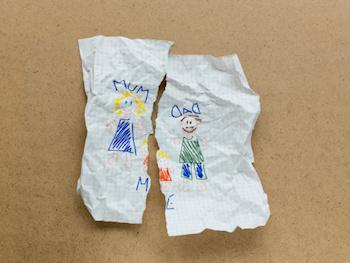The Effect of Divorce on Children
No matter what happens during the life of a relationship, if that relationship involves children, the primary goal of both parents should be to protect the well-being of the kids. While this is not always the case, most adults in America want what is best for their children. But what does that mean for married parents when they begin seriously considering divorce? The conventional wisdom is that divorce is hard on children, and that the children of divorced parents fare worse in life, both when they are young and once they have reached adulthood. However, more recent findings have shown that children raised in single-parent homes with a divorced parent are likely to adjust just as well as children from homes where parents remained married. Further, there are ways to lessen the impact of the divorce and secure a smoother adjustment for the children.
The conventional view of children of divorced parents is sullen, depressed, and angry. However, a recent study from the RAND Corporation shows that this view is exaggerated at best, and that the effects of divorce on the behavior and emotional well-being are marginal. Scholarly articles published before the RAND Corporation’s analysis studied the behavior of children of divorced parents, finding that their overall emotional well-being was less than that of children raised in two-parent households. However, those studies leapt to the conclusion that the divorce itself caused the dip in childhood well-being. They failed to take into consideration the level of conflict between parents preceding the divorce. In some cases, there were statistical findings that some groups of children of divorce exhibited fewer behavior problems than those with married parents. These were selectively downplayed or ignored.
A divorce, like any sudden change in a child’s life, is disruptive. Immediately following the divorce, children will show changes in behavior. However, a March 2013 article in Scientific American states that most children will have completely recovered from the divorce within two years. Therefore, while children will experience emotional issues immediately following divorce, these issues are temporary, and they can be mitigated.
Success as an Adult
Groups such as the National Marriage Project have claimed that it is crucial for children to be raised in a two-parent household, not just for their well-being as a child, but also for their success as an adult. They claim that single-parent households will produce children that are far more likely to fail than those raised in two-parent households.
The statistics show, however, that, while 25% of children of single-parent homes experience negative life outcomes as an adult, fully 10% of children from two-parent homes experience the similar negative outcomes. There is also no evidence indicating a direct causal link between the divorce and the lack of later success.
What Can You Do?
Scientific American points to a number of factors that will affect how a child will cope with divorce. Some of these factors are in the parents’ hands.
- Show affection and understanding to the child
- Don’t be too harsh in meting out discipline; also, don’t be too permissive
- Maintain economic stability










